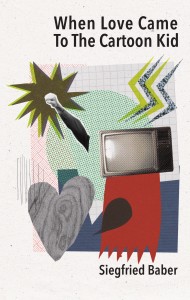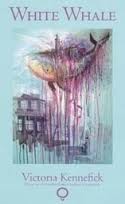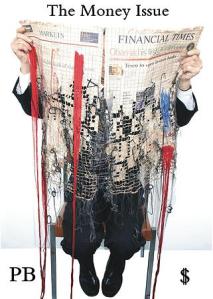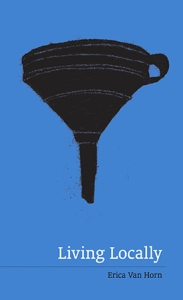Small things are the life blood of poetry: small presses, small chapbooks and little magazines all provide opportunities for younger poets to get published and for more established writers to find readers. Of course, the question of funding is a perennial problem, and one that has been exacerbated in recent years as financial crises have led to reductions in state arts funding. Publishers and poets have responded to this challenge in a variety of interesting ways as new models have been forced upon them.
 Telltale Press is a cooperative venture dedicated to the production of small pamphlets that act as poetic ‘calling cards’ for their writers. Poets pay into a fund that is used to cover the press’s costs and also pool expertise and mutual support as they put out their first publications. If When Love Came to The Cartoon Kid by Siegfried Baber is anything to go by, the results are attractive pocket-sized chapbooks with clear, crisp typefaces and a surprisingly ample amount of white space given the page size.
Telltale Press is a cooperative venture dedicated to the production of small pamphlets that act as poetic ‘calling cards’ for their writers. Poets pay into a fund that is used to cover the press’s costs and also pool expertise and mutual support as they put out their first publications. If When Love Came to The Cartoon Kid by Siegfried Baber is anything to go by, the results are attractive pocket-sized chapbooks with clear, crisp typefaces and a surprisingly ample amount of white space given the page size.
The blurb describes Baber as ‘an Armitage for Generation Tweet’, which strikes me as not doing him justice. His poems are more substantial than that. Many of them take the form of anecdote, real or imagined, with a tinge of mildly surreal humour: Mary in a street nativity wears a blue tracksuit; Wonder Woman is pensioned off while Superman remains babyfaced; a rifleless Lee Harvey Oswald drinks Coke in the Dallas sunshine. These poems are executed with a good deal of skill, although the versification can lack a certain tautness, a lyric inevitability:
Waiting for the bus two girls ask me
If they can please pet my dog.
I tell them it’s not mine, but they do it anyway.
In lines like these, the narrative impulse teeters on the edge of prose. At other times a definite sense of verbal music is in evidence:
Gabriel, stuck in the middle,
dressed to the nines
in his white linen suit,
trim, slim, glowing
and showing-off
his angelic smile
 Victoria Kennefick’s White Whale is a somewhat larger and more elegant calling card, with a larger page size than Baber’s booklet and featuring 21 poems to his 14. Produced by Southword, the publishing arm of the Munster Literature Centre, this is a handsome chapbook with a fine colour cover featuring a painting by Lora Zombie. Kennefick’s poems also explore the anecdote genre, albeit from a more serious position. The dominant theme is death: the deaths of moths, a calf, a whale, fish, a friend, a parent.
Victoria Kennefick’s White Whale is a somewhat larger and more elegant calling card, with a larger page size than Baber’s booklet and featuring 21 poems to his 14. Produced by Southword, the publishing arm of the Munster Literature Centre, this is a handsome chapbook with a fine colour cover featuring a painting by Lora Zombie. Kennefick’s poems also explore the anecdote genre, albeit from a more serious position. The dominant theme is death: the deaths of moths, a calf, a whale, fish, a friend, a parent.
The whale is a recurring motif in these poems, and Melville is evoked in a poem called ‘Moby-Dick’. It’s an ambitious and possibly dangerous comparison, with the capaciousness of the novel serving to emphasise the scrupulous narrowness of Kennefick’s canvas. As with Baber, the writing tends to be a little slack, with the rhythm somewhat unsure and rather more explication than is strictly necessary:
I put out the lights on looping walks around
the Lough, Fitzgerald’s Park, the entirety of the city.
I like to walk in silence, alone, I do not need to burn
the way you do. I’m glad you have a dog now.
Please know it’s because I felt lazy.
Kennefick is clearly an able writer and I would be interested to see her turn her attention to fiction; many of these poems contain the kernels of interesting short stories.
The genre of anecdotal verse has been extremely popular for the last decade or two, which is something of a two-edged sword. Clearly an appetite for this kind of writing exists, but with so much of it being published, it is increasingly difficult for younger writers to do anything new with it. There is a tendency, I feel, to think that the value of the writing resides in the nature of the story being told, depending on its being significant, quirky, revealing, and so on. But for poetry, technique is the real test. The sincerity of a poem resides not in the objective truth of its matter, but in the manner in which it is revealed through language.
Both Baber and Kennefick are clearly literate, intelligent and sensitive writers (allowing for different kinds of sensitivity). Their poems reflect the voices of literate people holding intelligent conversation with their peers, which is all well and good as far as it goes. However, it seems to me that poetry can, should and must go considerably further than that.
 The Poetry Bus started life as an online poetry magazine but has now burst into print with a themed Money Issue. This is a handsome 100-page journal/CD combination with poems, prose, visuals and music that, for the most part, respond more or less directly to the theme. There are about 70 individual contributors, ranging from the very well-known (Julian Gough, George Szirtes, Kevin Kiely), to young writers in their early 20s. There is also a pleasingly good gender balance among the contributors.
The Poetry Bus started life as an online poetry magazine but has now burst into print with a themed Money Issue. This is a handsome 100-page journal/CD combination with poems, prose, visuals and music that, for the most part, respond more or less directly to the theme. There are about 70 individual contributors, ranging from the very well-known (Julian Gough, George Szirtes, Kevin Kiely), to young writers in their early 20s. There is also a pleasingly good gender balance among the contributors.
The Bus is, to mix metaphors wildly, a broad church which seems wedded to no particular school or poetic position, and so is just the kind of publishing outlet that is vital to a healthy living literature. The Munster Literature Centre is listed as sponsor, but aptly enough given the theme of the issue, the major source of funding was a Fundit.ie campaign. The work included is, inevitably, of mixed interest (there are even some anecdote poems in there) and there are so many contributors that it would be invidious to pick some out. You’ll just have to buy a copy and read it for yourself. Long may it thrive.
Erica Van Horn is an American artist, writer and, as half of Coracle Press with her partner Simon Cutts, a printer and maker of fine books. For some years now they have been based in rural Tipperary, and Living Locally consists of extracts from a journal of life in her adopted home. It’s a typically attractive offering from Uniformbooks, a pleasure to hold in the hand and to read.
The extracts cover the period from summer 2007 to summer 2012, with the result that the bursting of the Celtic Tiger bubble forms the backdrop to much of what happens; unemployed builders, half-stocked shelves in the local shops and meditations on the second-hand car market reflect what Van Horn calls The New Austerity. There is, however, much more to the book than a transient politico-economic context. Dogs, both her own faithful Em and the neighbouring canines of all kinds feature heavily, as does the act of walking. Inevitably, rain is also a regular topic, and Van Horn is good on its infinite Irish variety. Death is another regular visitor, as it is in any community, but she tends not to dwell on its significance, preferring to treat is as an intrinsic part of everyday life.
She is also an at times amused observer of local social custom, but her chief delight is in language and how it is used by her Irish neighbours. There is a passing nod to such transatlantic variants as tap/faucet, but her main interest in in those words that mean something entirely new to her in her new surroundings. A fine example is a passage on the word ‘abroad’. For Van Horn, this means ‘out of the country/overseas’, and so she is both confused and delighted to hear that her friends have gone abroad in the fields and are expected back for lunch.
The book reads as if the original journal entries have been let stand more or less unedited, and the result is a prose that is fresh, clear and lucid. Living Locally is, as a result, one of the most enjoyable prose books I’ve read for some time.



Comments are good, please leave one.